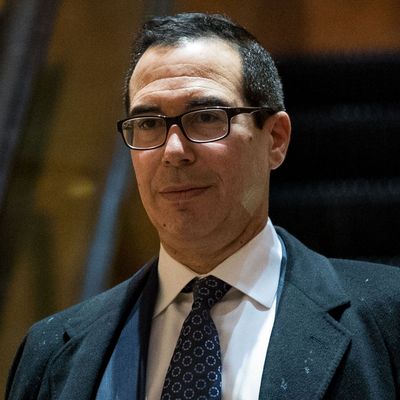
The finance industry had resigned itself to another eight years of burdensome regulations, subpoenas, and instantly viral harangues from an ever more powerful Elizabeth Warren. More than resigned — most of Wall Street had consented to this fate. The banking industry channeled the bulk of its campaign donations into Hillary Clinton’s campaign. Among corporate titans more broadly, only one chief executive of an S&P 100 company — Emerson Electric’s David Farr — invested in Donald Turump’s presidential bid.
This industry-wide shunning of Trump — combined with the candidate’s manifest unfitness for office and radically incoherent policy agenda — fed a common wisdom that the mogul’s election would be a pox on the market.
And then the Republican nominee won. And Wall Street suddenly remembered that Trump had promised tax cuts and deregulation — and bankers love tax cuts and deregulation.
Then the populist crusader — who had accused hedge-fund managers of “getting away with murder,” derided his opponent as a puppet of the big banks, and vowed to “drain the [D.C.] swamp” (that special interests had turned so fetid) — revealed that he and Wall Street have the same taste in economic managers.
Per Politico:
Former Goldman Sachs banker Steven Mnuchin has been seen at Trump Tower amid rumors that he’s the leading candidate for Treasury secretary. Billionaire investor Wilbur Ross appears headed to the Commerce Department. Steve Bannon, another Goldman alum, will work steps from the Oval Office. JPMorgan Chase CEO Jamie Dimon remains a possibility as Treasury secretary and will serve as an outside adviser if he doesn’t get the job.
It’s a restoration of Wall Street power — and a potential flip in the way the industry is regulated — perhaps unparalleled in American history.
“There is a joke going around here that if I’d have known how good Trump was going to be for Wall Street, I’d have campaigned for him,” one Goldman Sachs executive told the outlet. “What people are reacting to is this incredible cultural shift. People thought it might be 10 or 15 years until regulators stopped demanding heads and now all of a sudden you can envision it happening overnight.”
The S&P 500’s financial companies saw their stocks jump 11 percent the week after the election. And it isn’t hard to see why. Trump’s advisers have already signaled that they will eliminate the Obama administration’s “fiduciary rule,” which requires financial advisers to put their clients’ interests ahead of their own (specifically, it bars advisers from dumping lousy products onto their clients, for the sake removing them from their own firms’ balance sheets). Trump’s team has also promised to repeal the vast majority of the post-crisis financial reforms passed through Dodd-Frank. Meanwhile, the president-elect is expected to deliver massive, supply-side tax cuts and deficit spending — a recipe for Keynesianism, country-club style, that’s likely to spur faster growth (in the short term), higher interest rates, and an even greater concentration of wealth in the hands of the few.
Thus, Trump has done wonders for the economic anxiety of any banking executive who wasn’t sure that he (or she) could afford that new winter home or second yacht. And that giddy relief seems to have dispelled any worries they may have previously harbored about entrusting an emotionally volatile authoritarian with the most powerful army in human history.
“There’s a good chance that the ‘craziness’ factor will be smaller and play a lesser role in driving outcomes than many had feared,” Ray Dalio, founder of Bridgewater Associates, the world’s largest hedge fund, wrote on LinkedIn this week. “Our very preliminary assessment is that on the economic front, the developments are broadly positive—the straws in the wind suggest that many of the people under consideration … probably won’t recklessly and stupidly drive the economy into a ditch.”
Even if we bracket the concern that Trump will use state power to entrench a kleptocracy, there’s reason to think his economic plans will cause havoc in the long run. The argument for expansionary fiscal policy at a time of low inflation and low interest rates is strong — but the case for pursuing that policy primarily through tax cuts for the very wealthy is not. Trump’s plan will do little to shore up the bargaining power — and, thus, the purchasing power — of ordinary American workers. His deregulatory measures heighten the risk of further financial crisis. And his profligate deficit spending could eventually lead to higher borrowing costs — and will immediately strengthen calls for decimating social spending on the poor, the sick, and the elderly.
And then, of course, Trump’s agenda has a high chance of ensuring the end of organized human life within a matter of centuries.
But there’s an old Wall Street saying about the importance of living in the moment: “[By the time shit hits the fan] I’ll be gone and you’ll be gone.”
(And so will the Medicaid expansion. And Bangladesh.)






























